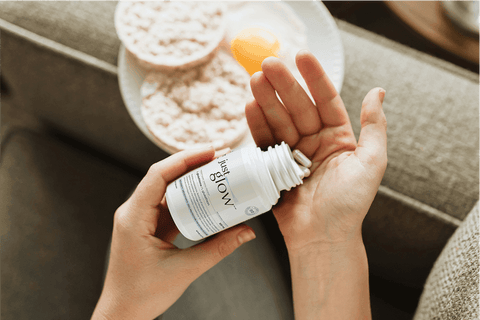What Foods Have Glutathione? Boost Antioxidant Levels

Key Takeaways:
- Glutathione is a powerful antioxidant produced by the body that protects cells from oxidative stress.
- Incorporating glutathione-rich foods into your diet can boost your antioxidant levels and offer various health benefits.
- Cruciferous vegetables, allium vegetables, avocados, meat, poultry, nuts, and seeds are excellent sources of glutathione or support its production.
- Vitamin C and sulfur-rich foods aid in the synthesis of glutathione within the body.
- Maintaining optimal glutathione levels supports detoxification, immune function, brain health, and reduced risk of chronic diseases.
Understanding Glutathione: Nature's Potent Antioxidant
Glutathione is known as the "master antioxidant." It's made from three amino acids. These are glutamine, cysteine, and glycine. It helps the body fight off damage from free radicals. They're unstable molecules that can harm our cells. Glutathione is important for detox, keeping our immune system strong, and helping our cells repair.
What is Glutathione?
This important molecule exists in every cell in our body. It's naturally created from amino acids like glycine and glutamic acid. What's fascinating is that cysteine is crucial for making glutathione, but it can be hard to get enough of it. Glutathione mainly works to protect our cells. It stops harmful free radicals from causing damage. This keeps our cells healthy and can prevent many health problems.
The Importance of Antioxidants
Antioxidants are our cell's guardians. They protect our cells from free radicals. These free radicals can come from the air we breathe or the food we eat. With enough antioxidants, our cells stay healthy. But if we have too many free radicals, our cells can get hurt. This can lead to serious health issues.
Glutathione's Role in the Body
Glutathione is a multitasker in our body. It works as a powerful fighter against free radicals. It also helps our body get rid of toxins. Glutathione is important for our immune system. It makes sure our body can build new proteins and DNA. This helps our cells repair and stay strong.
Keeping the right level of glutathione is key for good health. Eating foods high in glutathione is one way to do this. But, leading a healthy lifestyle is also important. This supports our body in making and using glutathione the best it can.
|
Glutathione Sources |
Benefits |
|
Cruciferous vegetables (broccoli, cauliflower, Brussels sprouts) |
Rich in sulfur-containing compounds that aid in glutathione synthesis |
|
Allium vegetables (onions, garlic) |
Contain sulfur compounds that support glutathione production |
|
Avocados |
Unique fruit containing significant amounts of glutathione |
|
Meat and poultry (grass-fed and organic) |
Good sources of glutathione and quality protein for its synthesis |
|
Nuts and seeds (Brazil nuts, walnuts, sunflower seeds) |
Rich in selenium, which supports glutathione peroxidase activity |
Foods Rich in Glutathione
To increase glutathione levels the natural way, turn to foods that are packed with this powerful antioxidant. Many items in our diet either have glutathione or help our bodies make more.
Cruciferous Vegetables
Vegetables like broccoli, cauliflower, and Brussels sprouts are full of sulfur-rich compounds. These help make glutathione. They give the body what it needs, like cysteine, for producing glutathione.
Allium Vegetables
Onions and garlic are also big on sulfur. They are great at setting the stage for the body to make glutathione. Plus, they add lots of flavor to dishes.
Avocados
Avocados are a standout because they actually have a lot of glutathione. They are creamy and rich in nutrients. You can enjoy them in many ways, from salads to smoothies.
Eating these three groups, cruciferous, allium, and avocados, is a smart move. They either offer glutathione directly or help the body produce it. Doing this, you support strong glutathione levels naturally.
|
Food |
Glutathione Content (mg/100g) |
|
Broccoli |
28 |
|
Cauliflower |
24 |
|
Brussels Sprouts |
20 |
|
Onions |
16 |
|
Garlic |
12 |
|
Avocado |
27 |
Looking at the table, it’s clear these foods are top choices for glutathione. They either have it or help the body make it. Adding them to your meals is an easy yet powerful way to boost glutathione levels.
Additional Glutathione-Rich Foods
Learning about foods rich in glutathione is key. It lets us know how we can boost our health. Eating these foods helps our body make more glutathione. This keeps our health in check.
Meat and Poultry
Meat and poultry, especially those that are grass-fed or organic, are top sources of glutathione. Their high-quality protein is vital for making more glutathione. Adding lean meats to our diet ensures we get this powerful antioxidant. It also covers our protein needs.
Nuts and Seeds
Nuts and seeds make great snacks and are also rich in glutathione. Brazil nuts, walnuts, and sunflower seeds are packed with selenium. Selenium helps produce and use an enzyme that keeps our glutathione levels up. This supports our cell health.
|
Food |
Glutathione Content |
Other Benefits |
|
Grass-fed Beef |
High |
Rich in protein, iron, and zinc |
|
Organic Chicken |
Moderate |
Lean protein source, versatile |
|
Brazil Nuts |
High |
Excellent source of selenium and healthy fats |
|
Walnuts |
Moderate |
Rich in omega-3 fatty acids and antioxidants |
|
Sunflower Seeds |
Moderate |
Good source of vitamin E and magnesium |
Adding these foods to our diet helps our body make and keep enough glutathione. This is important for our health and feeling good.
Boosting Glutathione Production Naturally
Eating foods high in glutathione is great for your health. Yet, certain nutrients also help your body make more of this important antioxidant. By using these natural boosters, you raise your glutathione levels. This brings many health advantages.
The Role of Vitamin C
Vitamin C is key in keeping glutathione working. It helps recycle glutathione after it fights off free radicals. This turns it back into a form the body can use again. Fruits like oranges, vegetables like bell peppers, and leafy greens can help increase your glutathione.
Sulfur-Rich Foods
Glutathione contains amino acids, including cysteine that has sulfur. Eating foods high in sulfur gives your body what it needs to make glutathione. Eggs, beans, and whey protein are top sources of sulfur for your body. Broccoli and Brussels sprouts also help, as they're good sources of glutathione and sulfur.
|
Food |
Sulfur Content |
Glutathione Content |
|
Eggs |
High |
Moderate |
|
Lentils |
High |
Low |
|
Whey Protein |
Moderate |
Low |
|
Broccoli |
Moderate |
High |
By eating a mix of sulfur-rich foods and vitamin C sources, you can boost glutathione. This leads to better protection against harmful molecules. It also supports your overall health.
Health Benefits of Optimal Glutathione Levels
To keep your body healthy, maintaining the right amount of glutathione is key. It helps our bodies clean out harmful stuff by supporting detox processes. Glutathione also fights off cell damage and keeps our immune system in check.
Eating certain foods can make our glutathione levels go up. Things like cruciferous veggies, avocados, and even meats help. These foods help our bodies make and use glutathione better. They improve our health overall.
Studies have found many health perks from having enough glutathione:
- It helps clear out toxins better.
- The immune system gets a boost, while inflammation goes down.
- Cells are protected against damage.
- Brain health and thinking skills might improve.
- There’s a lower risk of heart disease and cancer.
- The aging process may slow, helping you live longer.
Adding these glutathione-rich foods to our diet is easy. It’s a natural way to increase this important antioxidant in our bodies. Doing so helps us enjoy better health.
Factors that Deplete Glutathione
It's important to eat foods rich in glutathione and to help make more in our bodies. But, it's also key to know what can lower our glutathione. This way, we can keep our glutathione levels high and protect our health.
Oxidative Stress
Oxidative stress can lower our glutathione levels. It happens when our body can't handle the amount of harmful free radicals. These free radicals can hurt our cells and cause things like inflammation, aging, and disease. Glutathione helps fight these free radicals but turns into an inactive form itself in doing so.
Things like pollution, smoking, and ongoing inflammation make oxidative stress worse. Thus, they reduce the amount of glutathione we have.
Poor Diet
Eating poorly can also lower our glutathione. Not getting enough nutrients, especially those needed for making glutathione, is a big issue. We should eat foods that are high in sulfur and other important nutrients. These foods include cruciferous vegetables, allium vegetables, and eggs.
We should also ensure we get enough vitamin C, selenium, and amino acids like cysteine. These are crucial for making glutathione.
Age
As we grow older, making glutathione naturally gets harder. This leads to more oxidative stress and cellular damage. These things are linked to issues that come with aging. It's more important to support our glutathione levels with age. This can be done through what we eat and sometimes using glutathione supplements.
Knowing how to keep glutathione levels up is vital. We can do this by eating the right foods, managing stress, and looking into supplements. This approach is good for our health and quality of life.
Incorporating Glutathione-Rich Foods into Your Diet
To keep our glutathione levels healthy, we should eat foods that help our body make more. This is important because glutathione is a strong antioxidant. It helps our health in many ways. By planning our meals well, we can enjoy adding these foods to our diet.
Meal Planning Tips
When you plan meals, think about including these foods that are full of glutathione:
- Cruciferous vegetables like broccoli, cauliflower, and Brussels sprouts
- Allium vegetables such as onions and garlic
- Avocados, a unique fruit rich in glutathione
- Meat and poultry, especially the grass-fed and organic kinds
- Nuts and seeds, like Brazil nuts, walnuts, and sunflower seeds
These foods might help your body make more glutathione. This can keep your glutathione levels good.
Recipes and Meal Ideas
Try cooking meals with ingredients that have a lot of glutathione. For example, make a big stir-fry with broccoli and garlic. Or have an avocado and spinach salad with sunflower seeds. You can also make a beef stew with lots of vegetables. Adding these foods to your meals not only increases your glutathione but also makes your eating adventures more fun.
Keep in mind that glutathione is key for many processes in our body. Eating foods that boost its production is a natural way to stay healthy.
Precautions and Considerations
Glutathione-rich foods in our diet are safe and good for us. But, glutathione levels can change due to many things. So, it's smart to be careful in certain situations. People with health issues or who take medicine should talk to a doctor first. This is important before they eat more glutathione foods or take supplements.
Glutathione precursors like N-acetylcysteine (NAC) help the body make natural glutathione. Yet, using them too much can be bad. Always follow the right dose and get advice from a health pro.
To keep optimal glutathione levels, we need to do more than just eat right. A good balance diet with exercise and dealing with stress is vital. Things like being stressed, not sleeping well, and a bad lifestyle can harm activity of glutathione and its power as an antioxidant. Taking this broad approach helps our body make more natural glutathione to get all its benefits.
FAQ
What food has the highest amount of glutathione?
Avocado contains the highest amount of glutathione among foods. This nutrient-dense fruit is packed with antioxidants, including glutathione.
Which fruit is rich in glutathione?
Avocados are rich in glutathione, making them the top fruit choice for boosting your antioxidant intake.
What is the fastest way to increase glutathione?
The fastest way to increase glutathione levels is by consuming supplements like N-acetylcysteine (NAC) and alpha-lipoic acid (ALA), alongside eating glutathione-rich foods.
Does coffee increase glutathione?
Yes, coffee can increase glutathione levels. It contains compounds that stimulate the production of this vital antioxidant.
Conclusion
Boosting your glutathione levels through diet is a powerful way to enhance your overall health and well-being. By incorporating foods like spinach, avocado, asparagus, and walnuts into your meals, you can naturally increase your antioxidant intake. Ready to take your health journey to the next level? Visit Just-Glow for premium health supplements and personalized wellness tips designed to help you shine from within. Embrace a healthier lifestyle today with Just-Glow!
In This Blog
- Understanding Glutathione: Nature's Potent Antioxidant
- Glutathione's Role in the Body
- Foods Rich in Glutathione
- Additional Glutathione-Rich Foods
- Boosting Glutathione Production Naturally
- Health Benefits of Optimal Glutathione Levels
- Factors that Deplete Glutathione
- Incorporating Glutathione-Rich Foods into Your Diet
- Precautions and Considerations
Summary
In our journey towards improved health, we require a potent antioxidant known as glutathione. This compound shields our cells from damage triggered by oxidation. Consuming specific foods can boost our glutathione levels and bring numerous benefits to our health, such as boosting the immune system, aiding in detoxification, and reducing the risks of chronic diseases. Let's explore the best sources of glutathione in food and simple methods to incorporate more of it into our diets.




